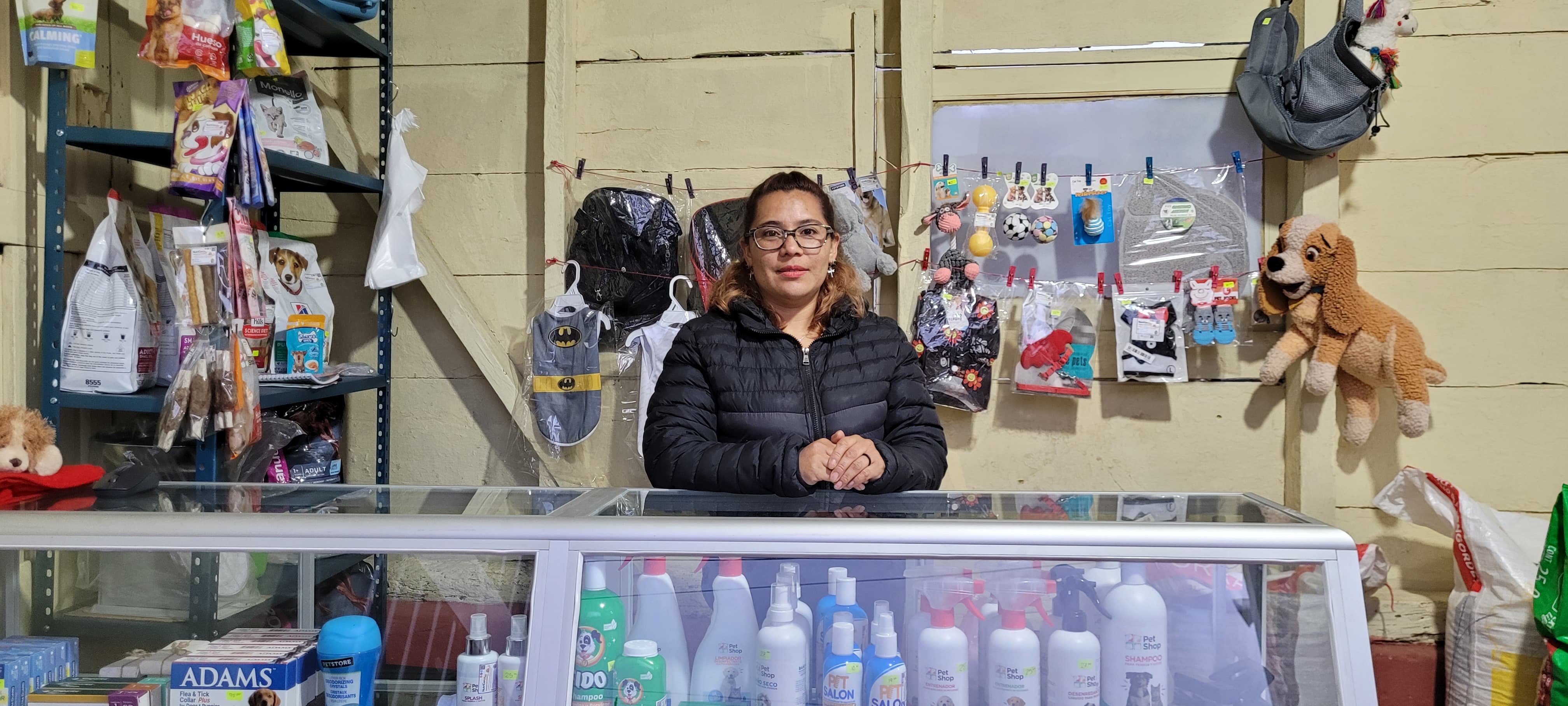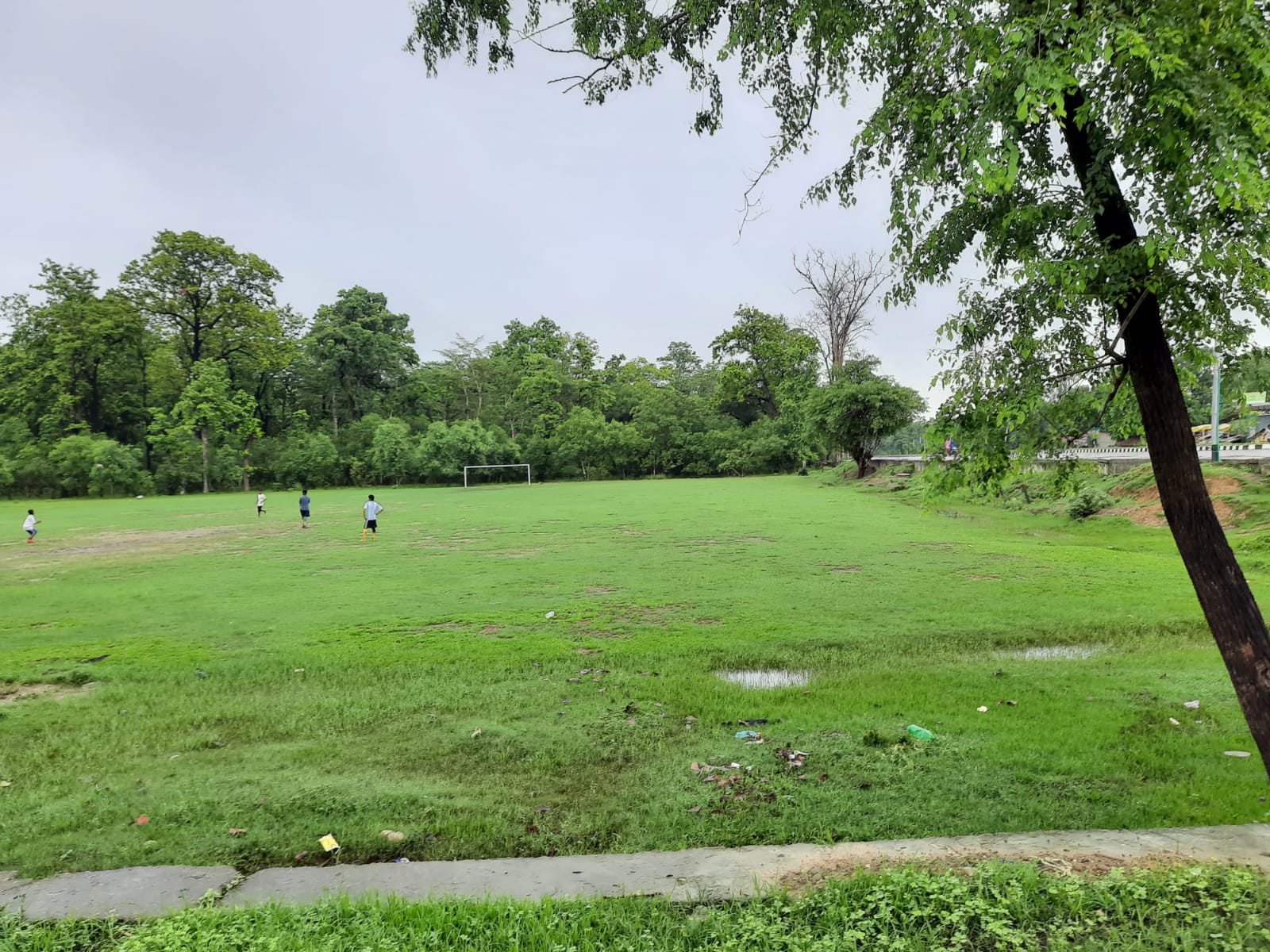Blog authored by Jessica Robey and Illana Melzer of 71point4*
The opinions expressed herein are solely those of the author(s) and do not necessarily reflect the official views of Cities Alliance or its members.
There is nothing quite like the joyful excitement of buying a home. But what if after the purchase, your new property doesn’t legally belong to you — because you don’t have the title deed? Owning a home can be a dream come true, but trying to obtain the paperwork after the sale can turn out to be a nightmare.
This was the complex situation facing two homebuyers in South Africa. Ms Yalezo and Ms Tekula had each purchased homes through informal cash sales. They paid sellers in cash for their houses and signed an affidavit at the local street committee. The transactions were never formalised, and official records continued to indicate the sellers as the owners of the properties. Mr Cube, a third client, inherited his property from his deceased father, but the property was still registered in his father’s name. These are common problems in a country where millions of property ownership records have not yet been legally updated. Securing the title deeds for properties like this is a long and complicated process. Fortunately, there’s a resource for homebuyers that offers support and assistance — for free! Help is available at the Transaction Support Centre (TSC)!
What is the TSC?
The Transaction Support Centre (TSC) is a walk-in advice office in Khayelitsha, Cape Town that provides free, hands-on assistance and advice to current and prospective property owners.
The TSC project was established jointly by the consulting company 71point4 and the Centre for Affordable Housing Finance in Africa (CAHF). The aim of this action-orientated research initiative is to support the growth of a residential property market that works effectively for the breadth of its participants, particularly lower income participants. Properties in the vicinity of the TSC are predominantly Government subsidy properties, allocated to lower income beneficiary households as part of South Africa’s extensive RDP housing programme.
A resource for both buyers and sellers
The TSC office helps property owners resolve issues with deceased estates, regularise informal cash sale transactions that have already taken place, obtain title deeds that have never been distributed or secure primary transfer where the house is still registered in the name of the city or the province. The TSC also helps buyers by facilitating access to financing and Government housing subsidies.
Along with helping buyers, TSC also supports sellers by helping them get their properties ‘sale ready.’ This may include helping property owners resolve arrears on municipal accounts and regularise unapproved building activity—for example, if a property had been remodelled or expanded in the past without the proper permits.
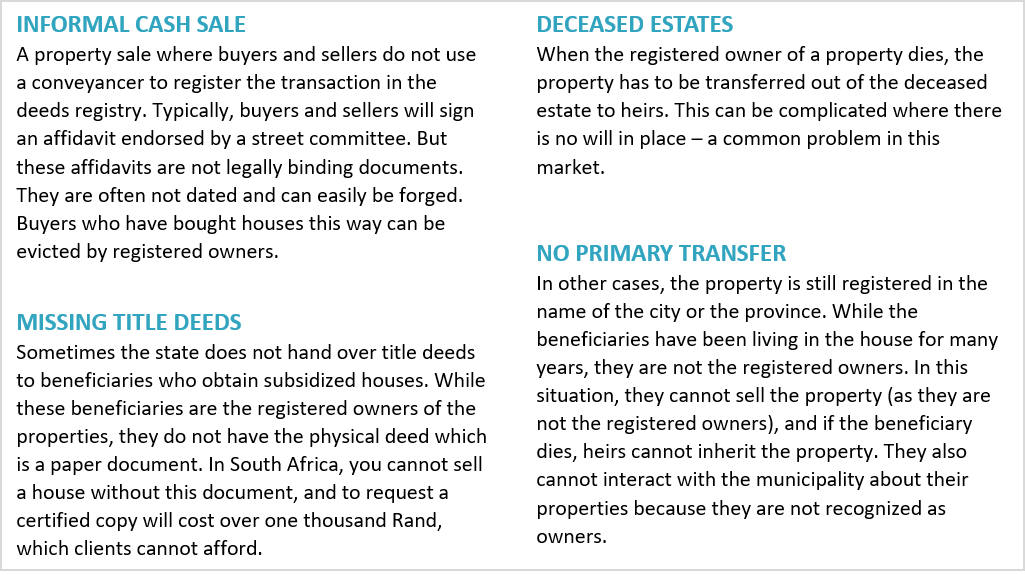
Helping hundreds of clients, especially women
Since opening its doors in July 2018, the TSC has logged 366 cases. Of these, 192 are currently ongoing, with close to 50 transfers currently in progress. To date the TSC has handed over 24 title deeds and has another two transfers currently lodged in the Deeds Office.
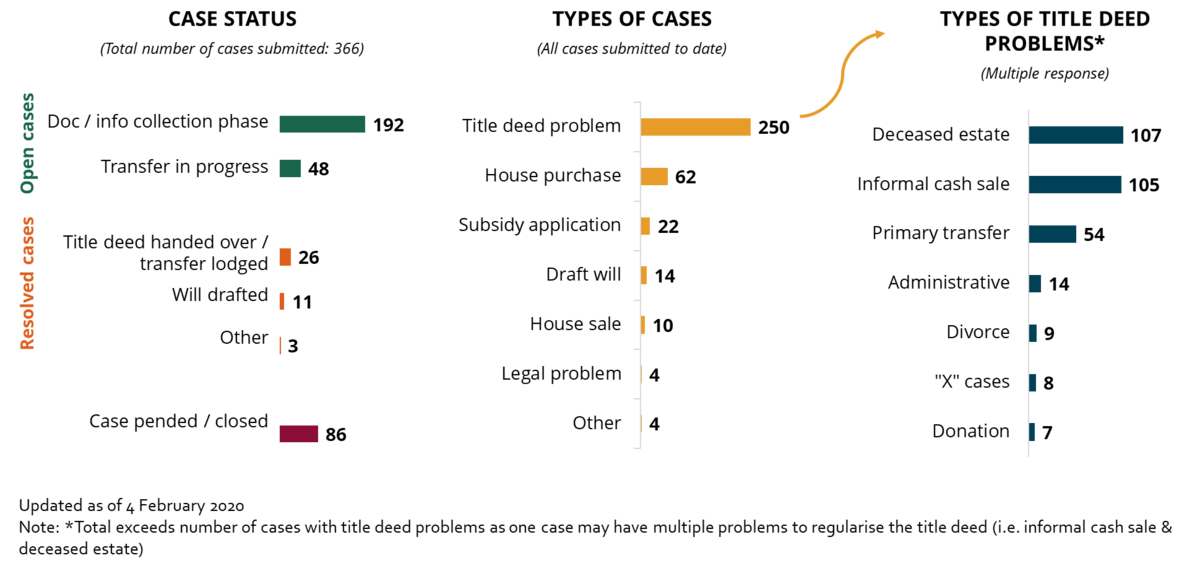
The majority of cases involve title deed problems, most commonly deceased estates and informal cash sales. In addition, over 50 clients have approached the TSC because no transfer has taken place on their subsidy properties. Other matters include administrative issues typically relating to official documents, such as incorrect ID numbers or misspelled names, as well as requests to donate properties and some divorces.
The TSC’s client base is predominantly female. Deceased estate cases in particular are strongly skewed towards female clients. This reflects broader demographic trends in South Africa: as of 2016, the median age at death for men was 52.7, while for women it was 62 years.
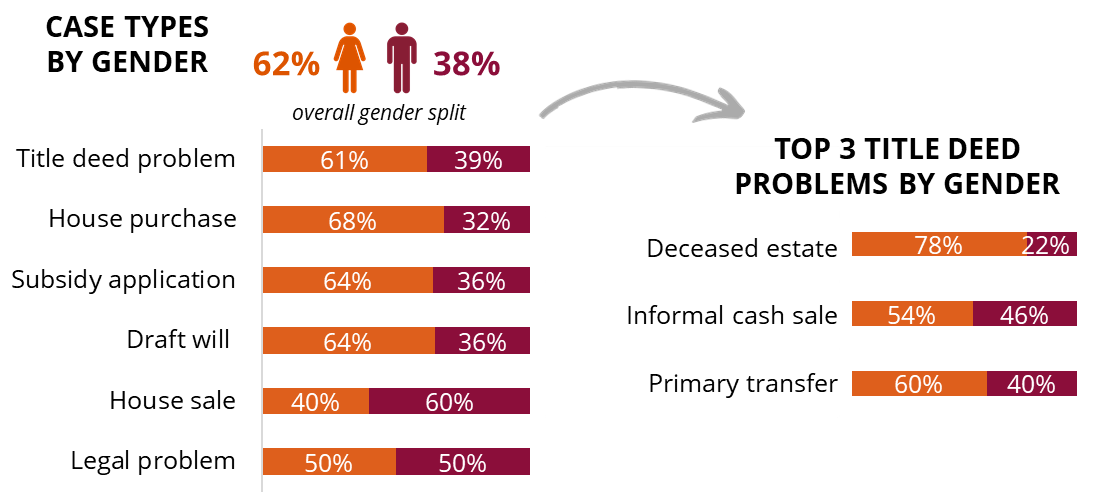
The high proportion of female clients may also reflect broader property ownership patterns in the area. Between August and September 2018, the TSC gathered data on 930 properties in Makhaza Khayelitsha as part of a pilot Blockchain project. Of the 930 properties surveyed, 670 were owner occupied, with the remaining properties occupied by tenants or caretakers. Of the owner-occupied properties, a relatively high proportion (44%) were reported to be owned by single women (including those reporting that they were the “only owner” of the property and were single, widowed or divorced).
How long does it take to resolve a title deed problem?
Even with help from the TSC, it can still take as long as 16 months to regularise an informal cash sale or 14 months to transfer a property out of a deceased estate. Many cases are complex and require the sequenced cooperation of many parties. In addition, the processes that enable property transfer are still paper-based rather than digital—which makes the work of the TSC more time consuming and difficult.
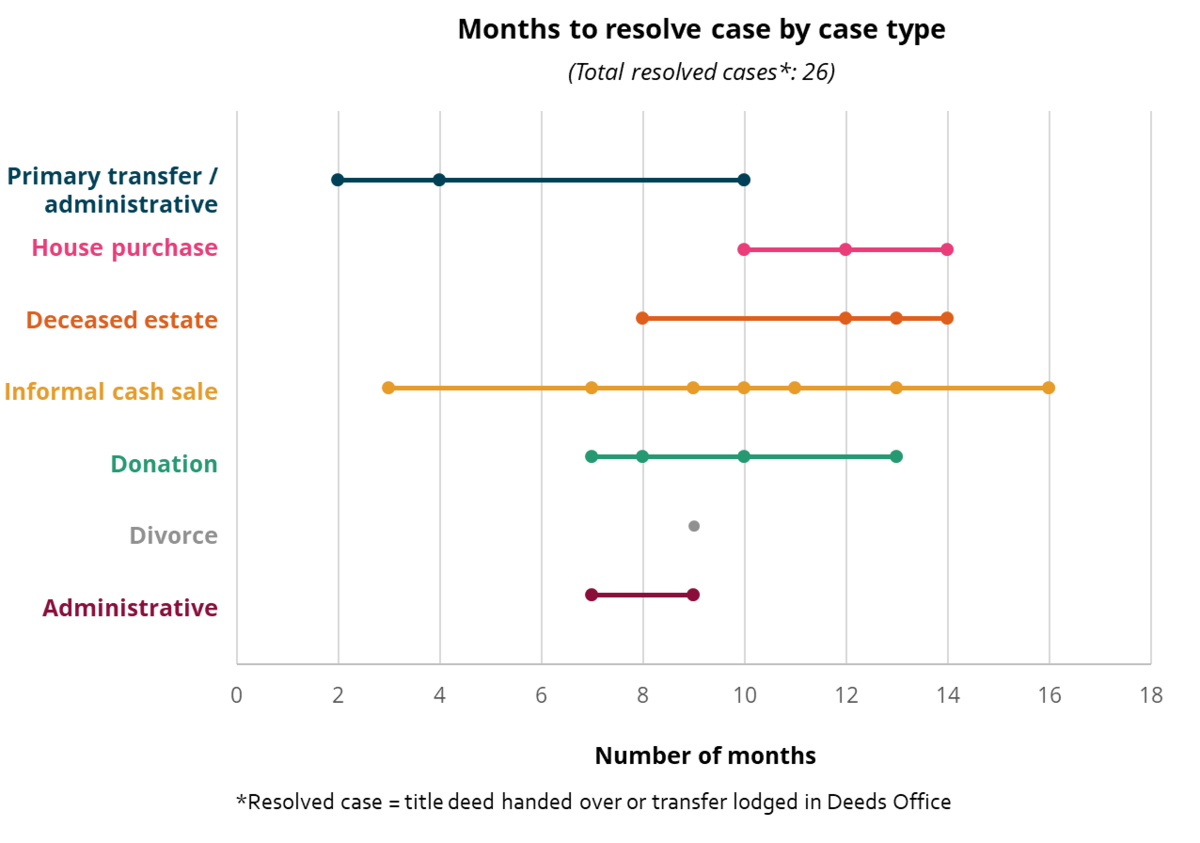
Nevertheless, the work is critical. The longer we delay tackling the very significant title challenges that plague properties in low-income areas, the worse the problem will get.
Scaling up to help more people
Beyond solving individual matters, the TSC also uses client case studies to generate evidence to drive systematic change in policy, legislation and key administrative processes. The TSC therefore engages extensively with policymakers and senior officials within all spheres of government and uses the experiences of the TSC’s clients to highlight policy gaps, legislative constraints and shortcomings in existing administrative processes that require resolution.
The TSC has no marketing budget, however, and relies predominantly on word of mouth, community meetings and referrals from local leadership structures such as street committees for client acquisition. It is therefore crucial to share the lessons learned from the TSC so that the effort can be scaled up and replicated in other metropolitan municipalities across South Africa.
* 71point4 is a Cape Town based strategic research consultancy specialising in consumer-focused, data-driven research across the African continent. Our work focuses on sectors that transform lives and issues that matter. This includes housing, financial services, healthcare, education and youth employment. The team at 71point4 comprises data scientists, economists and marketers who use a wide array of research methodologies and data sources ranging from big data to small, qualitative data to help our clients understand their customers and markets better.
** The TSC received grant funding from the Cities Alliance Innovation Programme. Click here to learn more.


